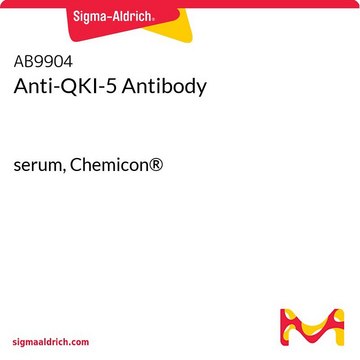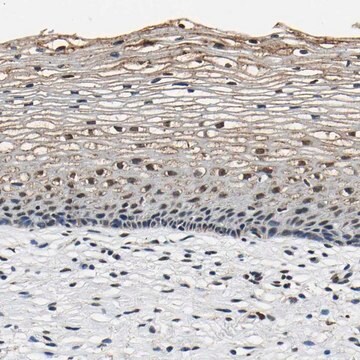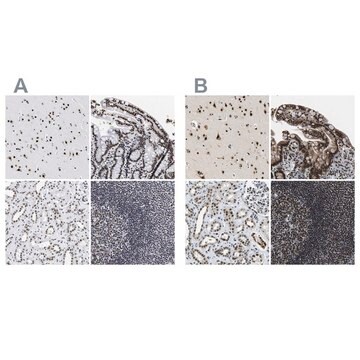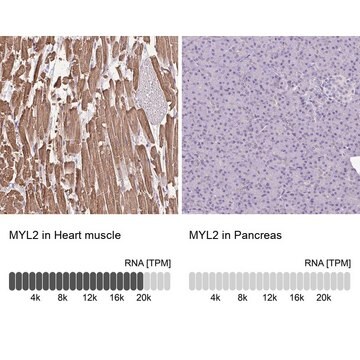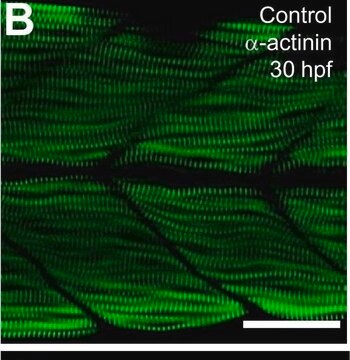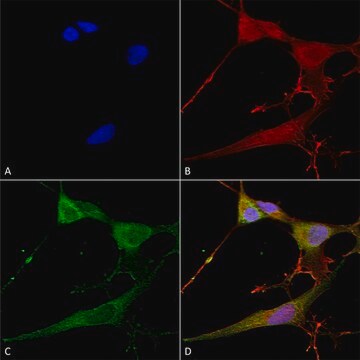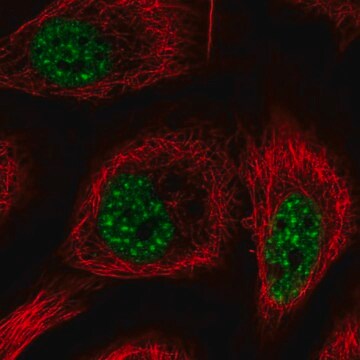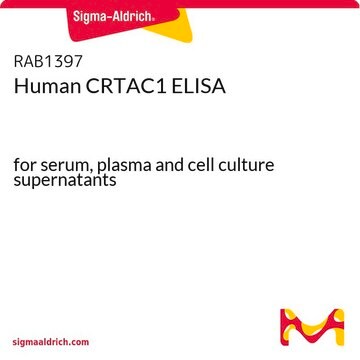추천 제품
생물학적 소스
rabbit
Quality Level
결합
unconjugated
항체 형태
affinity isolated antibody
항체 생산 유형
primary antibodies
클론
polyclonal
제품 라인
Prestige Antibodies® Powered by Atlas Antibodies
양식
buffered aqueous glycerol solution
종 반응성
human, mouse, rat
향상된 검증
orthogonal RNAseq
Learn more about Antibody Enhanced Validation
기술
immunoblotting: 0.04-0.4 μg/mL
immunofluorescence: 0.25-2 μg/mL
immunohistochemistry: 1:500-1:1000
면역원 서열
RAEIKLKRAVEEVKKLLVPAAEGEDSLKKMQLMELAILNGTYRDANIKSPALAFSLAATAQAAPRIITGPAPVLPPAALRTPTPAGPTIMPLIRQIQTAVMPNGTPHPTAAIVPPGPEAGLIYTPYEYPYTLAPATSILEYPIEPSGVL
UniProt 수납 번호
배송 상태
wet ice
저장 온도
−20°C
타겟 번역 후 변형
unmodified
유전자 정보
human ... QKI(9444)
일반 설명
The gene QKI (quaking) is mapped to human chromosome 6q26. It belongs to signal transduction and activation of RNA (STAR) protein family. QKI contains an RNA-binding domain (KH domain) and different splicing variants of QKI are present in frontal cortex of human brain.
면역원
Protein quaking recombinant protein epitope signature tag (PrEST)
애플리케이션
All Prestige Antibodies Powered by Atlas Antibodies are developed and validated by the Human Protein Atlas (HPA) project and as a result, are supported by the most extensive characterization in the industry.
The Human Protein Atlas project can be subdivided into three efforts: Human Tissue Atlas, Cancer Atlas, and Human Cell Atlas. The antibodies that have been generated in support of the Tissue and Cancer Atlas projects have been tested by immunohistochemistry against hundreds of normal and disease tissues and through the recent efforts of the Human Cell Atlas project, many have been characterized by immunofluorescence to map the human proteome not only at the tissue level but now at the subcellular level. These images and the collection of this vast data set can be viewed on the Human Protein Atlas (HPA) site by clicking on the Image Gallery link. We also provide Prestige Antibodies® protocols and other useful information.
The Human Protein Atlas project can be subdivided into three efforts: Human Tissue Atlas, Cancer Atlas, and Human Cell Atlas. The antibodies that have been generated in support of the Tissue and Cancer Atlas projects have been tested by immunohistochemistry against hundreds of normal and disease tissues and through the recent efforts of the Human Cell Atlas project, many have been characterized by immunofluorescence to map the human proteome not only at the tissue level but now at the subcellular level. These images and the collection of this vast data set can be viewed on the Human Protein Atlas (HPA) site by clicking on the Image Gallery link. We also provide Prestige Antibodies® protocols and other useful information.
생화학적/생리학적 작용
QKI (quaking) is suggested to be essential for oligodendrocyte differentiation and maturation in human brain. Disturbance in QKI splicing is associated with schizophrenia. Mouse homolog of QKI participates in neural development and myelination. It also controls the production of circRNAs during epithelial-mesenchymal transition. QKI is a regulator of alternative splicing. In lung cancer cells, it suppresses proliferation by regulating alternative splicing of NUMB (protein S171) gene.
특징 및 장점
Prestige Antibodies® are highly characterized and extensively validated antibodies with the added benefit of all available characterization data for each target being accessible via the Human Protein Atlas portal linked just below the product name at the top of this page. The uniqueness and low cross-reactivity of the Prestige Antibodies® to other proteins are due to a thorough selection of antigen regions, affinity purification, and stringent selection. Prestige antigen controls are available for every corresponding Prestige Antibody and can be found in the linkage section.
Every Prestige Antibody is tested in the following ways:
Every Prestige Antibody is tested in the following ways:
- IHC tissue array of 44 normal human tissues and 20 of the most common cancer type tissues.
- Protein array of 364 human recombinant protein fragments.
결합
Corresponding Antigen APREST86699
물리적 형태
Solution in phosphate-buffered saline, pH 7.2, containing 40% glycerol and 0.02% sodium azide
법적 정보
Prestige Antibodies is a registered trademark of Merck KGaA, Darmstadt, Germany
면책조항
Unless otherwise stated in our catalog or other company documentation accompanying the product(s), our products are intended for research use only and are not to be used for any other purpose, which includes but is not limited to, unauthorized commercial uses, in vitro diagnostic uses, ex vivo or in vivo therapeutic uses or any type of consumption or application to humans or animals.
적합한 제품을 찾을 수 없으신가요?
당사의 제품 선택기 도구.을(를) 시도해 보세요.
Storage Class Code
10 - Combustible liquids
WGK
WGK 1
Flash Point (°F)
Not applicable
Flash Point (°C)
Not applicable
가장 최신 버전 중 하나를 선택하세요:
Takahiko Suiko et al.
PloS one, 11(5), e0156033-e0156033 (2016-05-20)
Quaking (QKI), which belongs to the STAR family of KH domain-containing RNA-binding proteins, functions in pre-mRNA splicing, microRNA regulation, and formation of circular RNA. QKI plays critical roles in myelinogenesis in the central and peripheral nervous systems and has been
Fernando J de Miguel et al.
Molecular oncology, 10(9), 1437-1449 (2016-08-25)
Increasing interest has been devoted in recent years to the understanding of alternative splicing in cancer. In this study, we performed a genome-wide analysis to identify cancer-associated splice variants in non-small cell lung cancer. We discovered and validated novel differences
Karolina Aberg et al.
Proceedings of the National Academy of Sciences of the United States of America, 103(19), 7482-7487 (2006-04-28)
The quaking viable mouse mutation (qk(v)) is a deletion including the 5' regulatory region of the quaking gene (Qki), which causes body tremor and severe dysmyelination in mouse. The function of the human quaking gene, called quaking homolog KH domain
QKI regulates adipose tissue metabolism by acting as a brake on thermogenesis and promoting obesity.
Huanyu Lu et al.
EMBO reports, 21(1), e47929-e47929 (2019-12-24)
Adipose tissue controls numerous physiological processes, and its dysfunction has a causative role in the development of systemic metabolic disorders. The role of posttranscriptional regulation in adipose metabolism has yet to be fully understood. Here, we show that the RNA-binding
Liesbeth Backx et al.
American journal of medical genetics. Part A, 152A(2), 319-326 (2010-01-19)
Subtelomeric rearrangements involving chromosome 6q have been reported in a limited number of studies. Although the sizes are very variable, ranging from cytogenetically visible deletions to small submicroscopic deletions, a common recognizable phenotype associated with a 6q deletion could be
자사의 과학자팀은 생명 과학, 재료 과학, 화학 합성, 크로마토그래피, 분석 및 기타 많은 영역을 포함한 모든 과학 분야에 경험이 있습니다..
고객지원팀으로 연락바랍니다.
